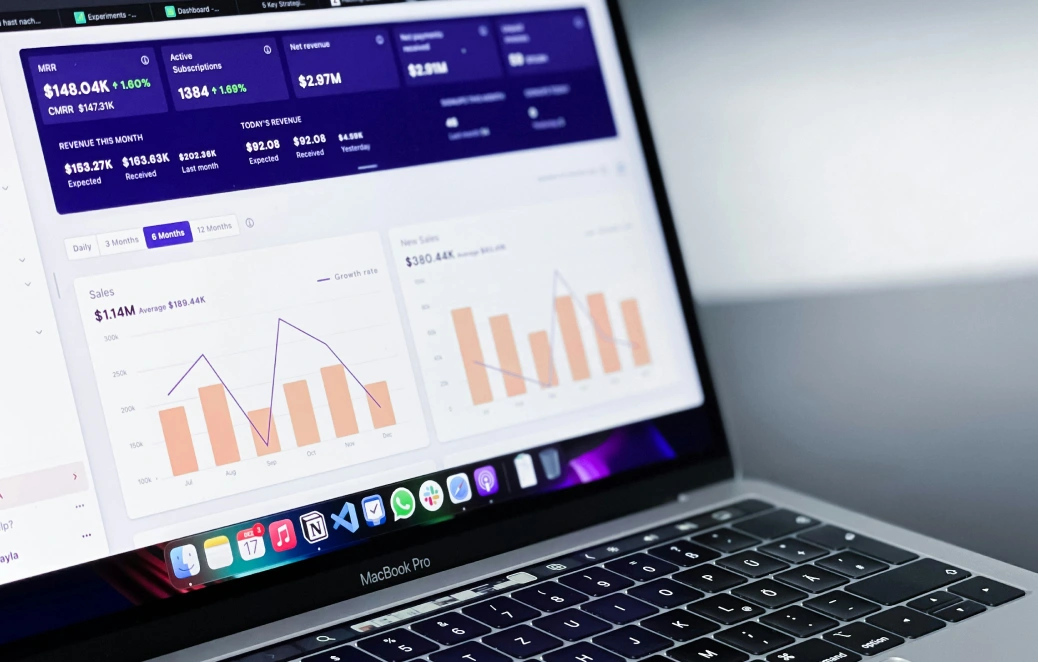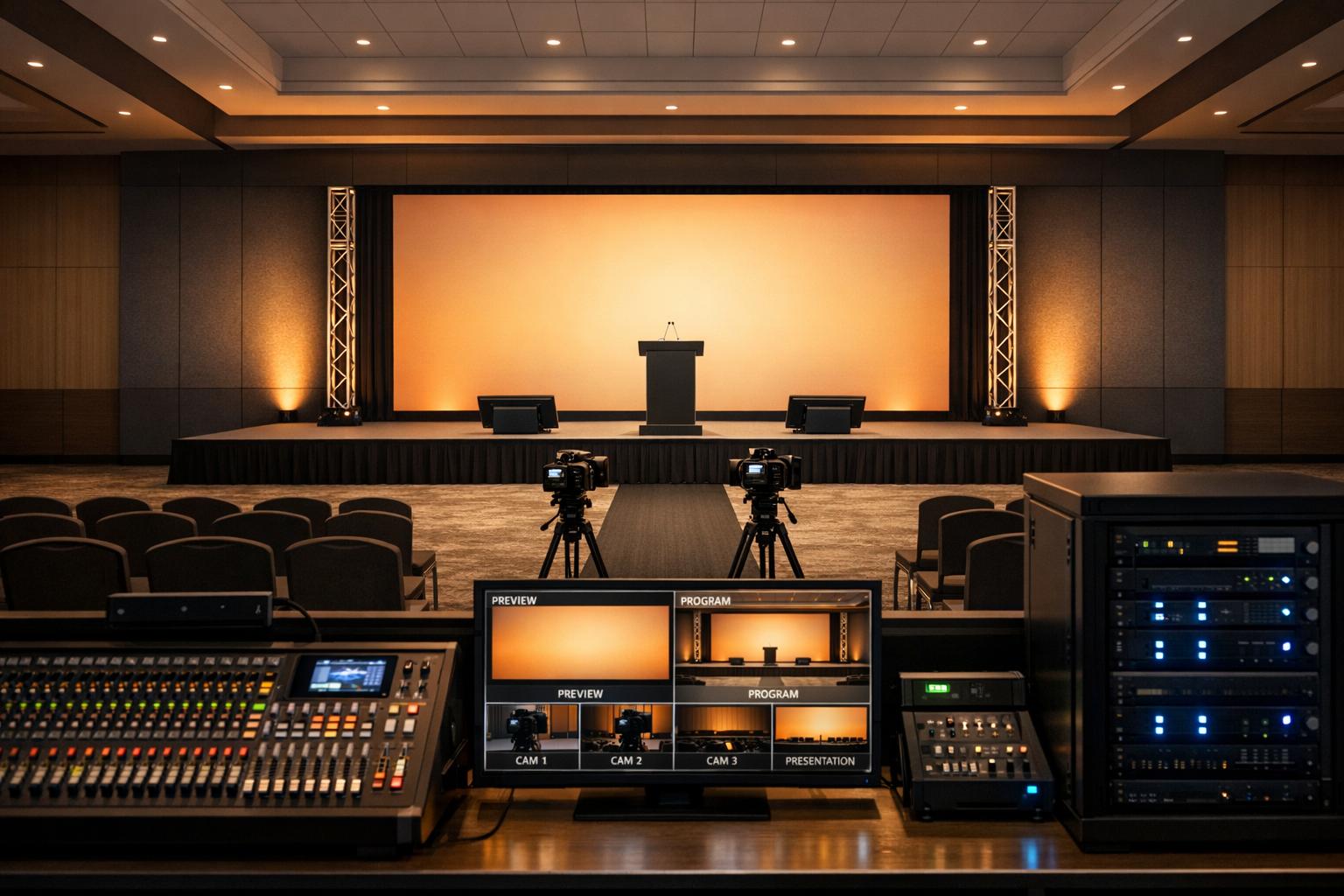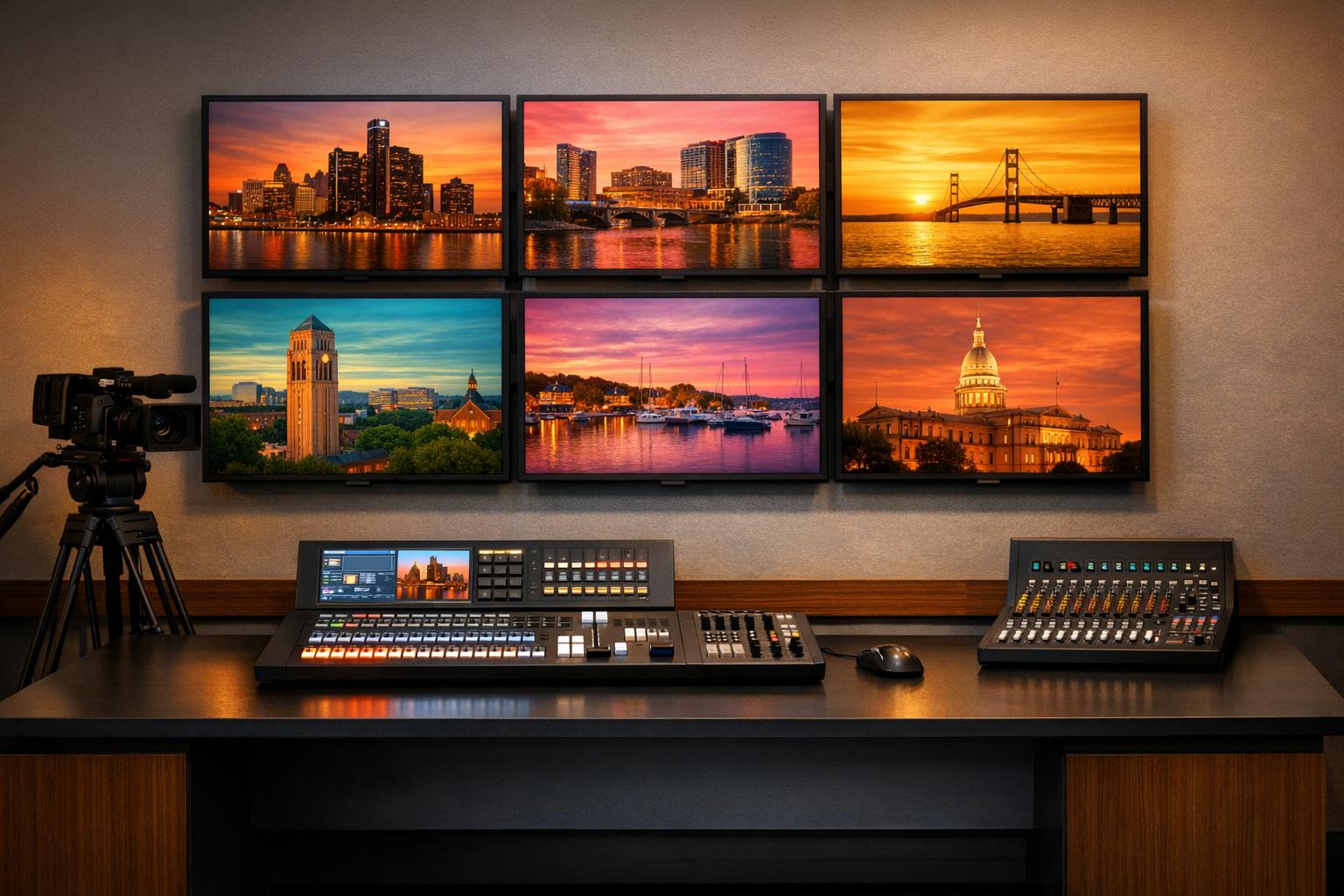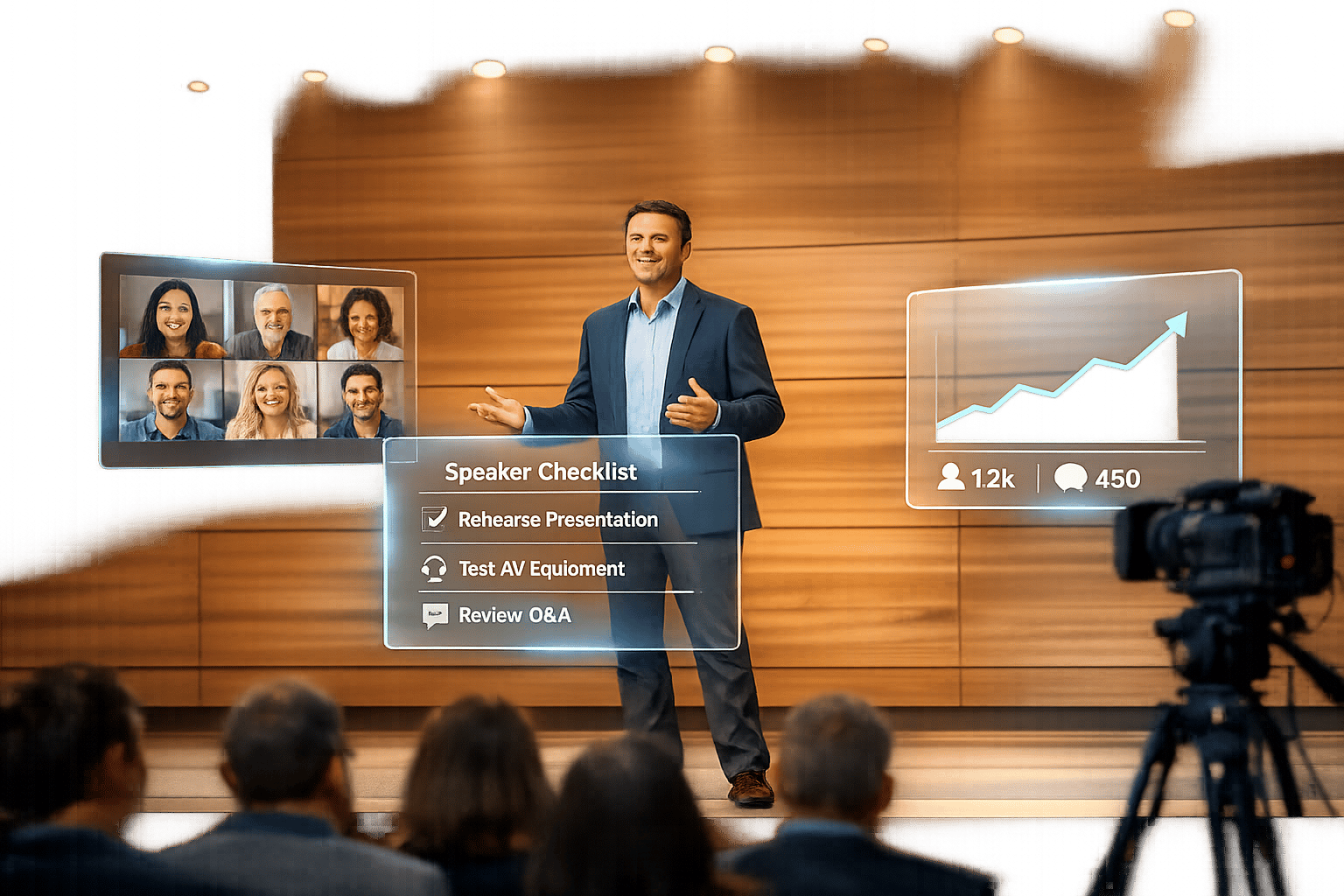Tips to Choose the Right AV Partner for a Large-Scale Meeting

Chief Executive Officer

Choosing the right AV partner can make or break your event. Whether you're hosting a conference for thousands or a hybrid meeting, the right team ensures flawless execution, high-quality audio and visuals, and smooth technical integration. Here's what you need to know:
- Assess Technical Expertise: Review their portfolio, past projects, and ability to handle large-scale setups.
- Confirm Resources: Ensure they have sufficient equipment, skilled staff, and backup plans for emergencies.
- Check Reliability: Look at client reviews, references, and response times for troubleshooting.
- Match Solutions to Goals: Align their AV offerings with your event's purpose, audience needs, and branding.
- Understand Costs: Request detailed pricing and review contract terms carefully to avoid surprises.
How to Source an A/V Vendor for Your Next Event - Part #2: My Evaluation Process - Logan Clements
Check Technical Skills and Experience
When selecting an AV partner for your event, it's essential to assess their technical expertise and ensure they have a proven history of handling the unique demands of large-scale events.
Review Past Work and Case Studies
Dive into their portfolio and case studies to see how they've managed complex setups and tackled challenges in the past. Look for examples that demonstrate their ability to deliver consistent, high-quality results. Pay special attention to events that align with your needs - similar attendee numbers, comparable venue types, or similar technical requirements.
Case studies that highlight how they solved unexpected problems can be especially revealing. These real-world examples offer a glimpse into their ability to adapt under pressure while maintaining service quality. If possible, request video footage or recordings from previous events to evaluate key aspects like audio clarity, visual presentation, and overall technical execution.
Confirm Technical Abilities
Make sure their technical skills match the specific demands of your event. Confirm their expertise in both fundamental AV principles and the particular systems you'll need. To go a step further, reach out to recent client references for feedback on their reliability, communication, and ability to meet deadlines. These checks are crucial to ensuring your event runs smoothly, with the high-quality AV systems you need to make it a success.
Confirm They Can Handle Your Event Size
When planning large-scale events, having the right resources and expertise in place is non-negotiable. Your AV partner must be equipped to meet the demands of your event without cutting corners. It's equally important to ensure their capabilities align with the specific requirements of your event.
Check Equipment and Staff Availability
For an event to run smoothly, your AV partner needs to have sufficient inventory to meet your needs without sacrificing quality or reliability. Ask about their equipment stock and whether they plan to rely on rentals. Depending on third-party rentals can introduce risks like delays or inconsistent equipment quality - issues you don’t want to face on event day.
Staffing is just as important. A corporate meeting for 2,000 attendees requires a completely different level of technical support than a smaller boardroom gathering. Make sure they can provide skilled, dedicated technicians who will be on-site to monitor and troubleshoot throughout the event.
If your event includes a hybrid component, their expertise should extend to advanced streaming setups. This includes handling multi-camera arrangements, interactive platforms, and ensuring smooth bandwidth management to avoid latency issues. Also, insist on a site survey. This helps identify venue-specific challenges such as power supply, acoustics, or sightline issues before they become problems.
Review Backup Plans
Even with the best planning, technical hiccups can happen. The key is working with a partner who has strong backup systems in place to minimize disruptions. They should have redundant equipment for every critical piece of the setup - backup microphones, spare projectors, alternative internet options, and duplicate streaming gear for hybrid events.
Ask about their backup protocols and how they handle emergencies. A reliable AV partner won’t just promise to fix problems - they’ll have a detailed plan for how to do it. This includes having staff dedicated to real-time monitoring and swift issue resolution.
Redundancy should extend beyond equipment. Look for measures like uninterruptible power supplies (UPS), backup generators, multiple internet connections, and access to emergency equipment sources. Request documentation of their contingency plans, which should clearly outline procedures for common technical failures. These plans should include contact information for key personnel, a list of backup equipment, and escalation paths for different types of issues.
Having this level of preparation in writing not only shows professionalism but also gives you peace of mind that they’re ready to handle any challenges that may arise.
Test Reliability and Service Quality
When organizing a large-scale meeting, technical expertise and event capacity are just the beginning. Ensuring reliability and service quality is equally vital for a smooth experience. Your AV partner’s track record can reveal a lot about what to expect on the big day. A history of consistent performance under pressure is a strong indicator of their ability to maintain professional standards throughout the event.
Read Client Reviews and Get References
To gauge their reliability, dive into their performance history. Ask for references and case studies from clients who’ve hosted similar events. A trustworthy AV partner should have no trouble providing testimonials that highlight their success and expertise.
"Ask for references or reviews from past clients who hosted events similar to yours. Request case studies that demonstrate their expertise and success stories." - Corporate Events, Inc.
When speaking with references, focus on specific areas like how they handle emergencies and execute backup plans. Ask about their communication style - were they accessible during pre-event planning? Did they communicate clearly? Learning whether they provided a dedicated point of contact who managed the event effectively can also be revealing.
Flexibility is another key consideration. Large events often come with last-minute surprises, so it’s important to know how well they adapt to unexpected changes. Additionally, inquire about the professionalism and expertise of their on-site crew, as they’ll be directly responsible for managing the technical aspects of your event.
Finally, ask about their problem-solving skills. How quickly and efficiently do they resolve issues? This will round out your evaluation of their service quality.
Test Response Time and Support
Reliability doesn’t stop at past performance - it extends to how responsive they are during the planning process and on event day. Their responsiveness now can give you an idea of how they’ll handle urgent situations later.
Ask direct questions about their on-site support capabilities. For example, how fast can they resolve technical problems? What’s their average response time when troubleshooting? A dependable partner should be able to share specific examples of how they’ve managed critical situations in the past.
Post-event support is another area to consider. Do they offer feedback and suggestions for future improvements? This kind of follow-up shows they’re not just focused on completing a single project but are invested in your long-term success.
You might also want to ask what sets their service apart from competitors. This can uncover unique strengths or qualities that go beyond their standard offerings.
Look for signs of proactive problem-solving, clear communication under pressure, and a commitment to delivering outstanding results throughout the entire event process. These qualities can make all the difference in ensuring your event runs smoothly.
sbb-itb-ae35a94
Match AV Solutions to Your Event Needs
Choosing an AV partner is just the beginning; the real challenge lies in ensuring their solutions align perfectly with your event's objectives. For large-scale meetings, customization isn’t optional - it’s essential.
Your AV partner should function as more than just a service provider - they need to be a collaborative partner. Their role is to craft solutions that amplify your message, going beyond standard audio and visual setups to create a cohesive experience that supports your event’s goals.
Connect Solutions to Event Goals
Start by clearly outlining your event’s main objectives to potential AV partners. Are you unveiling a new product and need eye-catching visual displays? Hosting a training seminar that calls for interactive breakout sessions? Or planning a hybrid event with both in-person and online participants? Each scenario demands a unique technical approach and specific equipment.
For events focused on audience engagement, tools like real-time polling systems, Q&A platforms, and audience response technologies are invaluable. These tools should integrate seamlessly into your presentation, enhancing interaction without disrupting the flow of content.
When it comes to executive presentations or keynote speeches, professional-grade lighting, high-quality microphones, and confidence monitors are non-negotiable. These elements ensure speakers can deliver their best performance without distractions, while the setup remains unobtrusive to the audience.
If your event includes live streaming, your AV partner must be skilled in managing multi-camera setups and professional-grade streaming platforms. This ensures a smooth broadcast experience for both in-person and remote attendees, maintaining high-quality visuals and audio throughout the event.
Additionally, consider how AV solutions can reflect your brand identity. From stage design to screen graphics and digital displays, your AV partner should incorporate your branding seamlessly. This attention to detail reinforces your corporate message and creates a unified experience for your audience.
All of these solutions must integrate smoothly with your overall event technology setup.
Check Technology Integration
Aligning AV solutions with your event goals is only part of the equation. Ensuring seamless integration with your existing technology infrastructure is equally critical. Modern events rely on multiple digital platforms working together without hiccups, and your AV partner needs to demonstrate expertise in this area.
For example, registration and check-in systems should sync effortlessly with your AV setup. This integration enables features like personalized greetings, automated session tracking, and smooth transitions between event segments. Be sure to ask how potential partners handle data synchronization and what contingency plans they have for any technical issues.
Sponsor management tools also require careful consideration. Your AV partner should know how to incorporate sponsor logos, videos, and other promotional materials into presentations without disrupting the event’s flow. They should also provide analytics to measure sponsor visibility and engagement, offering valuable insights post-event.
For events using mobile apps or digital engagement platforms, coordination with AV systems is crucial. Features like live polling, social media integration, and real-time feedback collection should complement your presentations rather than compete with them. Your AV partner must understand how to balance these elements to avoid overwhelming your audience.
Security is another critical factor. Your AV partner should meet your organization’s IT security standards, including secure network connections, encrypted data transmission, and controlled access to all integrated systems. Protecting your event’s data and ensuring a smooth experience for attendees should be a top priority.
Finally, test all integration capabilities well in advance of your event. Schedule a dedicated testing phase to confirm that every system works as expected. Ensure your AV partner has technical staff ready to address any issues that arise during this process, so your event runs without a hitch.
Review Pricing and Contract Terms
After confirming an AV partner's technical skills and reliability, it’s time to dig into the financial details that can make or break your event’s success. Just like a solid technical setup needs dependable partners, clear pricing and well-defined contracts are key to a smooth collaboration.
Once you're confident the AV team can deliver the solutions you need, shift your focus to reviewing costs. Keep in mind, the cheapest bid might come with hidden fees or compromises that could cost more in the long run.
On average, AV services account for about 15% of an event's budget, which for large-scale meetings can mean around $288,000. Understanding every line item ensures your investment is protected.
Get Clear Pricing Details
Ask for a detailed breakdown of costs. This should include production expenses, equipment rental, staffing, and any analytics services. A transparent estimate not only shows you where your money is going but also makes it easier to compare proposals.
Several factors can drive up costs. For example, events featuring high-profile speakers or complex setups require premium service levels. The event's scope, duration, and even the venue location can also influence pricing due to logistical challenges. Make sure to confirm additional costs like warranty coverage, licensing fees, and ongoing maintenance upfront.
If you’re planning multiple events, ask about pricing for future upgrades or expansions. Some AV partners offer financing options that can help spread costs over several budget periods.
Don’t underestimate the importance of commissioning and training. While some partners might cut corners to offer lower initial prices, this often leads to higher costs down the road due to system failures or insufficient training. Paying for thorough commissioning and user training upfront can save you from unexpected headaches later.
Read Contract Terms Carefully
Take your time reviewing contract terms. Pay close attention to cancellation policies, payment schedules, and post-event deliverables to avoid surprises that could strain your budget.
Cancellation policies can vary widely. Some providers require full payment regardless of when you cancel, while others offer partial refunds based on how far in advance you cancel. Knowing these terms upfront can save you from financial stress if plans change unexpectedly.
Payment terms are another critical area to review. Some AV partners may require large deposits months in advance, while others offer more flexible payment schedules. Make sure these terms align with your organization’s cash flow and procurement processes.
Also, clarify what’s included in post-event support. Look for details like service level agreements (SLAs), response times, and remote support availability. If your event involves ongoing technical needs, negotiate maintenance contracts to ensure long-term functionality.
Scope creep - where additional costs arise from changes to the project - can also be a challenge. Be clear about your requirements from the start to avoid surprise charges later. A good AV partner will work to understand your needs thoroughly, minimizing the risk of unexpected costs.
Compare Service Plans
When deciding between AV partners, comparing their service plans side-by-side can help you identify the best value for your needs. Here’s a quick look at how service levels typically stack up:
| Service Level | Equipment Quality | Staffing | Support | Typical Cost Range | Best For |
|---|---|---|---|---|---|
| Basic | Standard equipment, limited backup options | Minimal on-site staff, basic support | Business hours only | $50,000 - $150,000 | Small meetings, internal events |
| Professional | High-quality equipment, backup systems included | Dedicated staff, project manager | Extended hours, remote assistance | $150,000 - $400,000 | Corporate conferences, client events |
| Premium | State-of-the-art equipment, full redundancy | Full technical team, account management | 24/7 support, comprehensive training | $400,000+ | C-suite events, high-stakes presentations |
Booking early is another way to secure better deals. Starting your RFP process at least eight months - ideally 10 to 11 months - before your event gives you access to experienced partners and more competitive pricing. It also allows ample time for vetting and negotiating favorable contract terms.
Finally, consider the total cost of ownership rather than just upfront expenses. A partner’s approach to commissioning, training, and ongoing support can significantly affect your system’s long-term performance. Choosing full-service support may cost more initially but can save you from costly fixes or upgrades later on.
Conclusion: Making the Right Choice
Choosing the right AV partner is a critical step in setting your event up for success. The partner you select will play a key role in ensuring your message connects with your audience and that your event achieves its goals.
Start by clearly defining your event's purpose, complexity, and budget. These factors will help you evaluate potential partners based on what truly matters to your event’s success. A strong foundation like this makes it easier to find a partner whose expertise can deliver a seamless experience. AV solutions are more than just technical support - they’re tools to captivate audiences and elevate presentations, ensuring every moment leaves a lasting impression.
Experience and expertise should be at the top of your checklist. Look for partners with a solid history of handling large-scale corporate events. A strong portfolio and glowing client testimonials are reliable indicators of their ability to deliver. Their skill in managing unexpected technical challenges can be the difference between an event that runs smoothly and one that falters.
Another key consideration is the level of pre-production and on-site support they provide. The best AV partners take a structured approach, offering detailed planning before the event and comprehensive support during it.
Collaboration is essential during both pre-production and on-site phases. Work closely with your AV partner to share your vision and outline the event’s key requirements. This teamwork ensures that every detail - whether it’s the lighting, sound, or visuals - contributes to an exceptional experience for your attendees.
FAQs
How do I assess an AV partner’s technical expertise for a large event?
When planning a large event, it’s crucial to gauge the technical skills of your audiovisual (AV) partner. Begin by looking into their experience with events of a similar scale. Ask them to share examples of past projects they’ve handled successfully, and don’t hesitate to request client references. These references can provide valuable insights into their reputation and dependability.
Take a close look at the quality and variety of their equipment. Are they equipped with advanced audiovisual technology? Do they have the expertise to operate it effectively? It’s also important to discuss how they handle unexpected challenges. For instance, how quickly can they troubleshoot and resolve on-site technical issues? Their ability to respond under pressure can make or break your event.
Partnering with a team that has a proven track record ensures your event will run smoothly, leaving your audience with a polished and professional experience.
What backup plans should an AV partner have to handle emergencies during a large-scale event?
When you're planning a large event, having a dependable AV partner is crucial. They should come prepared with thorough contingency plans to handle any hiccups that might arise. This means having spare gear - like microphones, projectors, and cables - on hand, along with backup power solutions to keep things running smoothly.
A good AV team also prioritizes clear communication. They’ll assign you a dedicated technical contact and make sure all equipment is tested well in advance. These steps go a long way in reducing risks and keeping your event on track, even if surprises pop up.
How do I make sure the AV setup aligns with my event’s goals and branding?
To make sure your AV setup aligns with your event's goals and branding, start by sharing a clear picture of your vision, objectives, and key messages with your AV team. Be specific - let them know about your audience, the purpose of the event, and any branding elements like colors, logos, or themes that must be included.
Request customized solutions from your AV provider, such as mock-ups or visual previews, to get a feel for how everything will look and function in the event space. By working closely on these details, you can ensure the AV setup not only reinforces your branding but also supports your event's goals, delivering a smooth and unforgettable experience for your attendees.
Related Blog Posts









